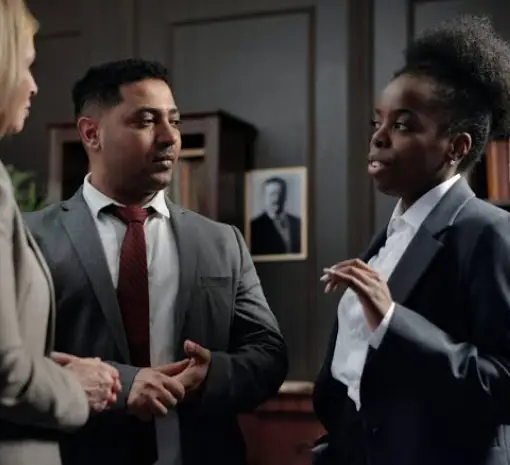Hiring a lawyer is an essential step when facing legal challenges, as it provides hope and assurance that professional expertise will be used to protect one’s rights and interests. Unfortunately, not all legal representations live up to the expectations of their clients. There are instances where clients pay their lawyers, but no progress is made on their cases. In this overview, we would discuss reasons why a paid lawyer would do nothing about and case and what a client can do about it.
I Paid My Lawyer and He Did Nothing: Here Are 10 Possible Reasons
This unfortunate situation can have severe consequences for the clients, both financially and emotionally. In this part, we explore ten possible reasons why a client might pay their lawyer and still receive no action on their case, emphasizing the importance of vigilance and communication in such situations.
1. Miscommunication or Lack of Clarity:
One common reason for inaction on a case after payment is a breakdown in communication between the client and the lawyer. Clients may not fully communicate the details of their case, or the lawyer might not ask for crucial information. As a result, the lawyer might be unclear about the desired outcome or strategy, leading to a lack of progress. A client may have a specific goal regarding a case but failed to communicate it effectively and left the entire case at the mercy of the lawyer assuming everything would be done; only to be shocked with the fact that none of his intentions has been carried out.
2. Overwhelming Caseload:
Lawyers, especially those in high-demand practice areas, can sometimes be overloaded with cases. This may cause them to inadvertently overlook or neglect certain cases, leading to delays or a lack of action. Overworked lawyers may struggle to manage their time effectively, impacting their ability to prioritize each case.
3. Incompetence or Lack of Experience:
Regrettably, some lawyers may lack the necessary expertise or experience to handle specific types of cases effectively. Incompetence or a lack of understanding of the relevant
ability to make progress on a case, leaving the client in a state of limbo.
4. Personal Issues or Crisis:
Lawyers, like any other professionals, may experience personal issues or crises that interfere with their ability to focus on their clients’ cases. Personal problems, health issues, or family emergencies can distract a lawyer from providing the necessary attention and dedication to their clients.
5. Legal Firm Troubles:
In some cases, it’s not just the individual lawyer but the law firm as a whole that may be struggling. Financial issues, internal conflicts, or changes in the firm’s management can lead to a lack of attention to clients’ cases, leaving the clients feeling ignored and unheard.
6. Lack of Motivation:
Clients paying their lawyers and receiving no action could also result from a lack of motivation on the lawyer’s part. If a lawyer doesn’t believe in the strength of the case or has lost interest, they may not put in the required effort to move the case forward.
7. Conflict of Interest:
In certain situations, a conflict of interest might arise that prevents the lawyer from effectively representing the client. This conflict could be due to a past or current client relationship, financial interests, or other personal connections that hinder the lawyer’s ability to advocate for the current client.
8. Legal Strategy Differences:
Clients might also find themselves at odds with their lawyers over the preferred legal strategy for the case. Disagreements on the best approach to take can lead to delays and a lack of action as both parties struggle to find common ground.
9. Fee Disputes:
Disputes over legal fees can sour the lawyer-client relationship, causing the lawyer to lose interest in the case. A disagreement over payment, payment delays, or client attempts to negotiate fees after the agreement can lead to a breakdown in communication and trust.
10. Client Retention:
Where the lawyer feels the need to retain the clients and would not want to lose them because of incompetence in a particular area of law, case overload, and other related reasons, he may contact another attorney on the client’s behalf with the aim to get the job done irrespective of who is doing it. This is unacceptable, however, because the lawyer ought to have informed the client of the new development and contacted another attorney with the approval of the client.
Experiencing a lack of action from a lawyer despite having paid for their services can be a deeply frustrating and distressing experience for a client. While there may be legitimate reasons for delays or inaction in some cases, it is essential for clients to be proactive in addressing these issues and seeking resolution. Maintaining open communication with the lawyer, expressing concerns, and, if necessary, seeking alternative legal counsel can help clients protect their rights and interests in such situations. It is crucial for clients to research and choose their legal representation carefully, ensuring that the lawyer they hire is reputable, experienced, and dedicated to providing the best possible service.
I Paid My Lawyer and He Did Nothing About the Case: What to Do Next?
Discovering that your lawyer has done nothing about your case despite having paid them can be a distressing and confusing experience. In this section, we present a comprehensive 7-step guide to help you navigate this challenging situation. From assessing the situation to considering legal action, we outline the necessary steps to seek resolution and hold your lawyer accountable.
Step 1: Assess the Situation and Gather Evidence:
When you find yourself in the frustrating situation of having paid your lawyer but seeing no progress on your case, it’s essential to take a step back and assess the situation objectively. Before making any accusations or decisions, gather all relevant documents, communications, and evidence related to your case and your interactions with the lawyer. This includes any agreements, invoices, emails, and notes from meetings or conversations.
Step 2: Communicate with Your Lawyer:
Open communication is key in resolving any misunderstandings or disputes with your lawyer. Schedule a meeting or call to discuss your concerns and ask for an explanation for the lack of progress on your case. Be clear and specific about your expectations and the actions you were expecting your lawyer to take. Give your lawyer an opportunity to address your concerns and offer potential reasons for the delay or inactivity.
Step 3: Seek a Second Opinion:
If you are dissatisfied with your lawyer’s response or find their explanations unsatisfactory, consider seeking a second opinion from another qualified attorney. A fresh perspective from another legal professional can shed light on whether your original lawyer’s approach was appropriate or if there were any missed opportunities in handling your case. During this consultation, avoid sharing any negative opinions about your current lawyer as it could potentially harm your case in the future.
Step 4: Review Your Contract:
Carefully review the contract or retainer agreement you signed with your lawyer when you first hired them. Pay close attention to the scope of work outlined, the expected timeline, and the responsibilities of both parties. Look for any clauses related to non-performance or breach of contract. Understanding the terms of your agreement will help you determine if your lawyer failed to fulfill their obligations and whether there are grounds for a legal complaint.
Step 5: File a Complaint:
If you believe that your lawyer has acted negligently or breached the contract, you may need to file a formal complaint with the appropriate governing body. In most jurisdictions, lawyers are regulated by a state or provincial bar association, and they have a system in place to handle client complaints. Provide all the evidence you’ve gathered to support your claim and follow the procedures outlined by the bar association. They will investigate the matter and take appropriate action if your lawyer is found to be in violation of their professional duties.
Step 6: Consider Mediation or Arbitration:
Resolving disputes through mediation or arbitration can be a faster and less expensive alternative to going to court. Some jurisdictions have mandatory mediation programs for attorney-client disputes. If your case falls within these requirements, consider this option before resorting to litigation. Mediation allows both parties to work together with a neutral mediator to find a resolution. If mediation is unsuccessful or not available, arbitration may be an option, where a neutral third party reviews the case and makes a binding decision.
Step 7: Take Legal Action:
If all attempts to resolve the issue have failed, and you believe you have a strong case against your lawyer, you may decide to take legal action. Consult with a new lawyer, preferably one experienced in legal malpractice or attorney-client disputes, to assess the strength of your case and discuss potential legal remedies. Keep in mind that legal malpractice cases can be complex and challenging, requiring substantial evidence to prove negligence or breach of duty.
Being in a situation where you paid your lawyer and they did nothing about your case can be disheartening, but it’s essential to address the issue promptly and responsibly. By following these seven steps – assessing the situation, communicating with your lawyer, seeking a second opinion, reviewing your contract, filing a complaint, considering mediation or arbitration, and taking legal action when necessary – you can work towards finding a resolution and potentially holding your lawyer accountable for their actions. Remember to stay persistent, patient, and seek professional advice throughout the process.
Last updated on: April 11, 2024




